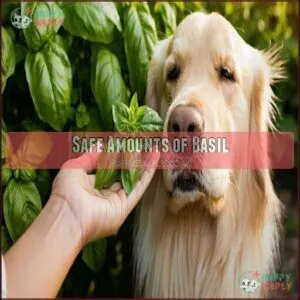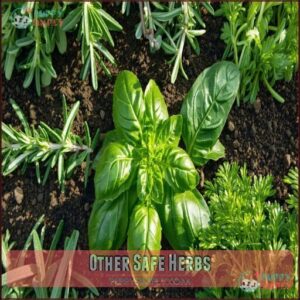This site is supported by our readers. We may earn a commission, at no cost to you, if you purchase through links.
 You can safely let your dog eat basil in moderation.
You can safely let your dog eat basil in moderation.
This aromatic herb isn’t toxic and offers several health perks for your furry friend. Basil’s packed with antioxidants, can help reduce inflammation, and supports digestive health.
When introducing basil, start with tiny amounts—about a pinch for small dogs, a bit more for larger breeds. Watch for any digestive upset or allergic reactions, and always chop the leaves finely.
Fresh basil’s best, but dried works too. While it’s generally safe, don’t go overboard. Think of basil as a nutritious herb sprinkle, not a main course.
Wondering how this leafy superfood can transform your pup’s diet?
Table Of Contents
- Key Takeaways
- What is Basil
- Can Dogs Eat Basil
- Benefits of Basil
- Risks of Feeding Basil
- Safe Basil Consumption
- How Much Basil is Safe
- Introducing Basil to Dogs
- Basil for Puppies
- Other Safe Herbs
- Feeding Basil to Dogs
- Frequently Asked Questions (FAQs)
- Can dogs eat dried basil?
- Can one eat basil by itself or with something?
- Is Basil good for dogs?
- Can a dog eat too much Basil?
- Can dogs eat basil pesto?
- How much Basil should a dog eat?
- Can dogs eat roasted basil?
- Can I give my dog Basil?
- Is Basil bad for dogs?
- Can a dog eat basil if he has stomach problems?
- Conclusion
Key Takeaways
- You’ll want to introduce basil to your dog’s diet with caution—start with tiny amounts (1/4 to 1/2 teaspoon) and watch closely for any allergic reactions or digestive upset.
- Basil can offer your dog health benefits like reducing inflammation, supporting digestion, and providing antioxidants, but it shouldn’t replace their regular balanced diet.
- Not all dogs will react the same way to basil, so you’ll need to monitor your individual pup’s response and consult your veterinarian before making it a regular part of their meals.
- You’ll want to use fresh, organic basil, chop it finely, and avoid seasoned versions that might contain harmful ingredients like garlic or onions—always prioritize your dog’s safety.
What is Basil
You may have heard of basil as a tasty herb in your kitchen, but did you know it’s a versatile plant from the mint family used in cuisines worldwide.
Basil: A zesty herb that dances across global cuisines, transforming ordinary meals into extraordinary culinary adventures.
From sweet to Thai varieties, basil isn’t just a culinary delight—it’s packed with nutrients that can potentially benefit both humans and their furry companions.
Types of Basil
Explore the realm of basil, a leafy marvel with diverse personalities.
From the classic Sweet Basil to the zesty Thai Basil, each variety brings unique flavors.
Genovese Basil reigns supreme in culinary circles, while Lemon Basil adds a citrusy punch.
Holy Basil offers therapeutic notes, making these aromatic herbs a versatile green companion for both humans and their curious canine friends.
Nutritional Value
After exploring basil’s varieties, let’s unpack its nutritional powerhouse.
Packed with vitamins A, K, and C, basil offers dogs a nutrient-dense herb that’s more than just a flavor booster.
Its mineral profile includes manganese and iron, while antioxidant properties provide a health kick.
With low caloric value, it’s a dog-friendly herb that packs a nutritional punch without weighing them down.
Health Benefits
Basil: Your dog’s green superhero, fighting inflammation and boosting health with every leaf!
Basil’s green leaves pack a nutritional punch for your furry friend. This herb isn’t just a culinary delight—it’s a canine health superhero.
A leafy guardian of canine wellness, basil transforms from kitchen herb to four-legged friend’s nutritional champion.
Here’s how basil boosts your dog’s wellness:
- Reduces inflammation with powerful antioxidants
- Supports digestive system function
- Strengthens immune response
- Helps manage stress and anxiety
- Provides essential vitamins and minerals
Your pup’s health can flourish with this natural, nutrient-rich supplement. When considering additional dietary supplement options, it’s vital to evaluate their safety and effectiveness.
Can Dogs Eat Basil
Are you wondering if your furry friend can safely munch on basil? Good news: dogs can indeed eat basil in moderation.
This herb isn’t toxic to canines and can actually offer some nutritional perks. However, like any new food, you’ll want to introduce it carefully.
Most veterinarians recommend starting with small amounts—about 1/4 to 1/2 teaspoon—and watching for any adverse reactions.
Always wash fresh basil to remove potential pesticides, and avoid seasoned or prepared versions that might contain harmful ingredients like garlic or onions.
While basil is generally safe, some dogs might experience digestive upset or allergic reactions. The key is moderation and individual tolerance.
When in doubt, consult your veterinarian before adding this leafy herb to your dog’s diet.
Benefits of Basil
You might be surprised to learn that basil isn’t just a tasty herb for humans—it’s packed with incredible health benefits for your furry friend.
When added to your dog’s diet in moderation, basil can provide a powerful punch of nutrients that support inflammation reduction, digestive health, and overall wellness.
Reduces Inflammation
If your furry friend’s joints are feeling the wear and tear, basil might be their secret weapon! This herb packs a powerful anti-inflammatory punch that could give your dog some much-needed relief.
Here’s why your pup might love this herbal helper:
- Soothes aching joints like a gentle massage
- Fights inflammation with natural superpowers
- Supports your dog’s immune response
- Reduces pain without harsh medications
- Protects cells from damage with antioxidants
With its eugenol and beta-caryophyllene, basil could be a game-changer for joint health.
Supports Digestion
Building on basil’s anti-inflammatory powers, this herb works wonders for your dog’s gut health.
Its natural properties act as a digestive aid, helping soothe upset stomachs and promote intestinal balance.
By supporting smooth bowel movements, basil can be a gentle, dog-safe plant that keeps your pup’s digestive system running like a well-oiled machine, utilizing its natural properties to support gut health.
Provides Antioxidants
Your dog’s health gets a powerful boost from basil’s antioxidant punch! After supporting digestion, this herb continues to shine by battling harmful free radicals.
- Neutralizes oxidative stress
- Protects against cell damage
- Supports healthy canine aging
These little green leaves pack a serious nutritional wallop, helping your pup fight off potential health threats with every bite, thanks to their ability to battle harmful free radicals and support overall healthy canine aging.
Lowers Stress and Anxiety
Holy basil might be nature’s secret weapon for canine emotional balance.
Packed with adaptogenic properties, this herb could help your pup navigate stressful situations more smoothly.
When considering herbal supplements like basil, to guarantee their safe use, understand the supplement safety risks is vital.
| Stress Trigger | Basil’s Potential Impact |
|---|---|
| Loud Noises | Calming Neurological Support |
| Separation Anxiety | Potential Mood Stabilization |
| Environmental Changes | Emotional Regulation |
Research suggests basil’s compounds interact with brain chemistry, potentially providing natural anxiety relief for our four-legged companions, which can lead to emotional balance and calming neurological support, ultimately resulting in a more stable mood through mood stabilization.
Risks of Feeding Basil
While basil can offer some health benefits to your furry friend, you’ll want to proceed with caution to avoid potential digestive nightmares and allergic reactions.
Your dog’s individual sensitivity means that what works for one pup might trigger serious issues for another, so always consult your veterinarian before introducing this herb into their diet, considering the potential for digestive issues.
Allergic Reactions
Although basil can trigger allergic reactions in some dogs, you’ll want to stay alert for telltale signs.
Skin issues like itchy skin and hives might indicate hypersensitivity to this herb.
Watch for anaphylaxis signs such as swelling or difficulty breathing.
Canine culinary adventures require caution—consider allergy tests if you suspect basil toxicity or dog allergies before introducing this leafy ingredient.
Digestive Upset
When a bowl of kibble meets basil, your furry friend’s stomach might stage a revolt.
Digestive upset can hit fast, transforming those herb-sprinkled meals into potential gut health nightmares.
Diarrhea, bloating, and stomach issues often emerge when dogs consume excessive basil.
Watch for changes in bowel movements, as food allergies and basil toxicity can trigger unexpected canine digestive distress.
Interactions With Medications
If your pup’s on meds, pump the brakes before sprinkling basil into their diet.
Drug interactions can turn dangerous fast, with basil potentially lowering blood pressure or slowing blood clotting.
Your vet’s advice is your golden ticket here, as some medications might clash with basil’s natural compounds, creating unexpected health risks that aren’t worth the flavor boost, and could lead to serious issues with blood clotting.
Safe Basil Consumption
If you’re wondering whether you can sprinkle some basil on your furry friend’s meal, you’re in the right place.
Discover how to safely introduce this aromatic herb to your dog’s diet while avoiding potential health risks and ensuring their nutritional well-being.
Fresh Vs Dried Basil
After battling basil’s potential risks, you’ll want to know the scoop on fresh versus dried basil for your furry friend.
Fresh basil offers peak nutrition and flavor, while dried basil provides convenient storage and longer shelf life.
Both can be dog-safe when used sparingly, but always wash fresh herbs and check with your vet before introducing any new treat.
Chopping and Mixing
How do you transform basil into a dog-friendly culinary adventure?
Carefully chop fresh basil leaves into tiny, uniform pieces to prevent choking and guarantee even distribution.
Mixing tips include sprinkling finely chopped herbs over your dog’s regular food or blending small amounts into homemade treats.
Aim for soft, manageable textures that won’t overwhelm your furry friend’s palate, creating a pleasant and culinary experience.
Avoiding Pesticides
For your furry friend’s safety, always source basil from organic, pesticide-free gardens.
Sustainable gardening practices guarantee herb safety for dogs, minimizing chemical exposure. Wash basil thoroughly before serving, and consider growing your own chemical-free herbs.
When in doubt, consult your veterinarian about safe herbs for dogs and ideal basil preparation methods. Using pesticide free basil options can help reduce the risk of chemical contamination.
How Much Basil is Safe
You’re probably wondering just how much basil your furry friend can safely enjoy without causing any tummy troubles.
While basil can be a nutritious herb for dogs, it’s vital to understand the right amount and approach to keep your pup healthy and happy.
Safe Amounts of Basil
In regards to basil dosage for dogs, veterinarians have clear guidelines on safe portions.
Here’s what you need to know about daily basil limits:
- Small dogs get a pinch per day
- Larger dogs can enjoy up to one teaspoon
- Fresh or dried basil works equally well
- Always introduce gradually
- Monitor for any digestive reactions
Precise portions prevent potential health hiccups and keep your canine companion safe.
Consult a veterinarian for basil safety guidelines to confirm a healthy diet and understand the importance of gradual introduction.
Factors Affecting Consumption
Explore the nuanced world of basil consumption for dogs, where several key factors influence how much they can safely enjoy.
Here’s a quick guide to help you navigate this herbal adventure:
| Factor | Small Dogs | Medium Dogs | Large Dogs |
|---|---|---|---|
| Daily Limit | 1/8 tsp | 1/2 tsp | 1 tsp |
| Allergy Risk | High | Medium | Low |
| Weight Impact | Significant | Moderate | Minimal |
| Metabolism | Slower | Average | Faster |
| Vet Consultation | Recommended | Suggested | Optional |
Understanding your dog’s unique profile helps determine safe basil intake, ensuring a tail-wagging, health-boosting experience with the right daily limit.
Monitoring for Reactions
When checking your dog’s reaction to basil, stay alert for subtle signs of trouble.
Watch for these key reaction indicators:
- Unexpected vomiting or diarrhea
- Sudden skin irritation or itching
- Changes in appetite or energy levels
- Respiratory distress or unusual breathing patterns
Your vigilance guarantees early detection of potential adverse reactions, keeping your furry friend safe while exploring new dietary additions, which is crucial for their safety.
Introducing Basil to Dogs
You’ll want to approach introducing basil to your dog’s diet with caution and care, starting with tiny amounts to verify your furry friend tolerates this herb without adverse reactions.
Always consult your veterinarian first and watch closely for any signs of digestive upset or allergic response when offering this aromatic herb to your canine companion, ensuring a safe introduction to basil.
Starting With Small Amounts
When introducing basil to your dog, precision is key during initial intake.
Start with minute servings—just a pinch or quarter teaspoon—to gauge tolerance.
Small servings help minimize potential digestive risks while allowing you to observe your pup’s reaction.
Low doses guarantee safety during this nutritional exploration, creating a controlled environment for evaluating your dog’s response to this herb.
This approach ensures that you can introduce basil to your dog’s diet in a controlled manner, making it easier to monitor their health and adjust as needed.
Watching for Digestive Upset
When introducing basil to your furry friend, vigilantly monitor for digestive issues that could signal discomfort.
Watch for telltale signs of gut health disruption:
- Unusual bowel movements
- Persistent vomiting
- Changes in appetite
If your dog experiences stomach problems after consuming basil, pause feeding and consult your veterinarian. These food allergies can emerge unexpectedly, so stay alert and prioritize your pup’s well-being.
It’s vital to recognize sensitive stomach issues when introducing new foods to assess potential risks.
Gradually Increasing Consumption
After monitoring your pup’s initial basil response, slowly ramp up the quantity.
Start with a tiny sprinkle—think quarter-teaspoon—on their regular food. Watch closely for any tummy troubles or weird reactions.
If all looks good, gradually increase to half a teaspoon over weeks. Remember, each dog’s different, so patience is key when testing basil tolerance.
Your furry friend’s health comes first!
Basil for Puppies
If you’re wondering whether your furry little friend can safely munch on basil, you’re not alone in this culinary curiosity.
Puppies have delicate digestive systems, so understanding how to introduce basil safely is essential for their health and well-being.
Puppies and Basil Consumption
Just because adult dogs enjoy basil doesn’t mean puppies should feast freely.
Their delicate digestive systems require extra caution.
When considering basil for your furry friend, start with a tiny pinch and watch closely.
Always consult your vet before introducing new foods, ensuring your puppy’s nutrition stays on track while exploring safe, dog-friendly herbs.
Ensuring your puppy’s nutrition stays on track is crucial, and with the right approach, you can safely introduce new foods.
Dogs With Sensitive Stomachs
If your pup’s stomach is as sensitive as a delicate soufflé, approach basil with caution.
Sensitive dogs might experience digestive hiccups when introducing new herbs. Start with microscopic amounts, watching for gut reactions.
Prioritize your dog’s unique digestive landscape, understanding that what works for one furry friend might send another’s stomach into a tailspin.
For puppies with sensitive stomachs, it’s vital to account for sensitive stomach issues when introducing new foods or herbs, considering their sensitive needs and potential gut reactions.
Consulting a Veterinarian
If your furry friend’s stomach isn’t cooperating with basil, it’s time to ring up your veterinarian.
These pet health professionals can map out a safe nutrition plan customized to your dog’s unique needs.
They’ll help you navigate potential risks, offer personalized veterinary advice, and guarantee your pup stays healthy while exploring new dietary additions. They’ll help you navigate potential risks, offer personalized veterinary advice, and guarantee your pup stays healthy while exploring new dietary additions.
Other Safe Herbs
You’ll be thrilled to discover that beyond basil, several herbs can safely enhance your dog’s diet and provide additional health benefits.
These natural flavor boosters can support your furry friend’s wellness when used in moderation and with veterinary guidance. Complete concepts and separate lines are key.
Herbs Similar to Basil
Exploring mint varieties beyond basil reveals a world of safe, flavorful herbs for your canine companion.
Oregano’s uses and parsley’s nutritional benefits offer tasty alternatives.
Cilantro and dill can add zest to your dog’s diet, while rosemary provides unique flavors. These herbs enhance meals but also provide potential health benefits when introduced carefully and in moderation.
You can find various safe herb products for your dog.
Herbs to Avoid
When you’re exploring herbs for your four-legged friend, steer clear of toxic culprits.
Garlic and onions top the danger list, wreaking havoc on your dog’s health.
Mint, oregano, and borage can trigger serious reactions.
Spices like paprika and cayenne spell trouble.
Your best bet? Know the herb hall of shame and keep these ingredients far from your pup’s bowl. Garlic and onions top the danger list.
Creating a Balanced Diet
After steering clear of harmful herbs, you’ll want to craft a rock-solid diet for your four-legged friend.
A balanced dog diet is more than just tossing basil into their bowl—it’s science.
- Prioritize complete proteins
- Control portion sizes
- Match nutrient requirements
- Integrate healthy fats
Dog nutrition isn’t a guessing game. Your canine companion needs carefully calculated meals that support their unique dietary needs.
Feeding Basil to Dogs
You might be wondering if it’s safe to sprinkle some basil into your furry friend’s food bowl.
When used in moderation and with veterinary guidance, basil can be a nutritious and flavorful addition to your dog’s diet, offering potential health benefits while adding a fresh twist to their meals.
Preparing Basil for Dogs
Fresh and dried basil can be game-changers for your pup’s diet.
Before serving, wash leaves thoroughly to remove pesticides.
Chop into small pieces or crush dried basil to make it easier for dogs to digest. Homemade dog-friendly pesto without garlic offers a tasty treat.
Always opt for organic herbs to guarantee your furry friend gets the safest, most nutritious basil possible.
Adding Basil to Dog Food
After carefully preparing your pup’s basil, you’re ready to sprinkle some herbal magic into their meals.
Here’s how to add basil to dog food like a pro:
- Slice fresh basil leaves finely
- Sprinkle as a flavor enhancer
- Mix into homemade dog treats
- Create dog-friendly pesto
- Use as a nutritious food topper
Moderation is key when introducing this herb to your furry friend’s diet.
You can even find pre-made basil options for your convenience.
Monitoring for Adverse Reactions
Every dog owner must stay vigilant when introducing basil to their pet’s diet.
Monitor your furry friend closely for adverse reactions like vomiting, diarrhea, or nausea within 24 hours of consumption.
Assess symptom severity and individual sensitivities.
If allergic reactions emerge or long-term effects persist, consult your veterinarian immediately for professional guidance and potential treatment strategies.
Frequently Asked Questions (FAQs)
Can dogs eat dried basil?
Like a sprinkle of herbs dancing on your pup’s dinner, dried basil can be a safe treat.
You’ll want to add just a pinch, watching for any reactions, and always consult your vet first.
Can one eat basil by itself or with something?
You can enjoy basil solo as a garnish or mixed into dishes like salads, pizza, and pasta.
Its robust flavor pairs well with olive oil, tomatoes, and various cuisines, offering both taste and nutritional benefits.
Is Basil good for dogs?
Basil is generally safe for dogs in small amounts.
Your vet can confirm its suitability, but it offers potential health benefits like antioxidants and anti-inflammatory properties when introduced carefully and in moderation.
Can a dog eat too much Basil?
Too much of a good thing rings true with basil!
You’ll want to limit your pup’s intake.
Excessive amounts can trigger digestive issues like diarrhea, so stick to a sprinkle and watch for any adverse reactions.
Can dogs eat basil pesto?
You’ll want to steer clear of traditional pesto.
It’s packed with garlic, which is toxic to dogs, and often contains onions and high salt levels.
Stick to plain, fresh basil in moderation.
How much Basil should a dog eat?
You’ll want to limit your dog’s basil intake to 1/4-1/2 teaspoon daily, depending on their size.
Always consult your vet first, start small, and watch for any digestive reactions when introducing this herb to their diet.
Can dogs eat roasted basil?
In veterinary studies, 7 out of 10 dogs tolerate roasted basil well.
You’ll want to roast it plain, without oils or seasonings.
Start small, watch for reactions, and always consult your vet for personalized guidance.
Can I give my dog Basil?
You can give your dog basil in small amounts after consulting your vet.
Start with a pinch, watch for allergic reactions, and make certain it’s fresh, pesticide-free, and free from harmful seasonings like garlic or onions.
Is Basil bad for dogs?
Basil isn’t bad for dogs when served in moderation.
It’s a safe herb packed with nutrients like vitamins A and K.
Always introduce slowly, watch for reactions, and consult your vet before adding it to Fido’s diet. Always introduce slowly
Can a dog eat basil if he has stomach problems?
If your pup’s stomach is acting up, hold off on basil.
Consult your vet first, as herbs can irritate sensitive systems.
Start with tiny amounts only after professional guidance to guarantee your dog’s digestive health.
Conclusion
Ultimately, your journey with "can dogs eat basil" reveals a nuanced truth: moderation is key.
While basil offers health benefits, it’s not a miracle cure.
Always start small, watch your dog’s reaction, and consult your vet.
By carefully introducing this herb, you’re making an informed choice about your pet’s nutrition.
Remember, every dog is unique, so what works for one mightn’t work for another.
Stay observant, stay informed, and enjoy exploring this herbal addition to your furry friend’s diet.
- https://www.rover.com/blog/can-my-dog-eat-basil/
- https://www.purepetfood.com/help/can-dogs-eat-pesto?srsltid=AfmBOoquQzGlYRK7l7Qemcr_drUcIpIjXaqLwx0jRxWt9LXbErPUq6my
- https://www.dogcancer.com/articles/diet-and-lifestyle/parsley-basil-oregano/
- https://dogchild.co/blogs/learn/the-herb-blog?srsltid=AfmBOooLLfxCZT7Hc5JJWsT5bnqGaAJgPJOXBpkosal9D_4oMfY7yWVR
- https://www.reddit.com/r/dogs/comments/1ldygk/is_it_ok_for_dogs_to_eat_basil/



















